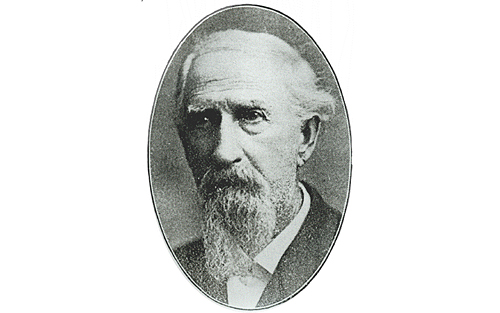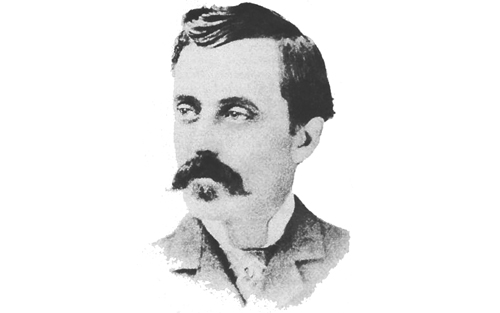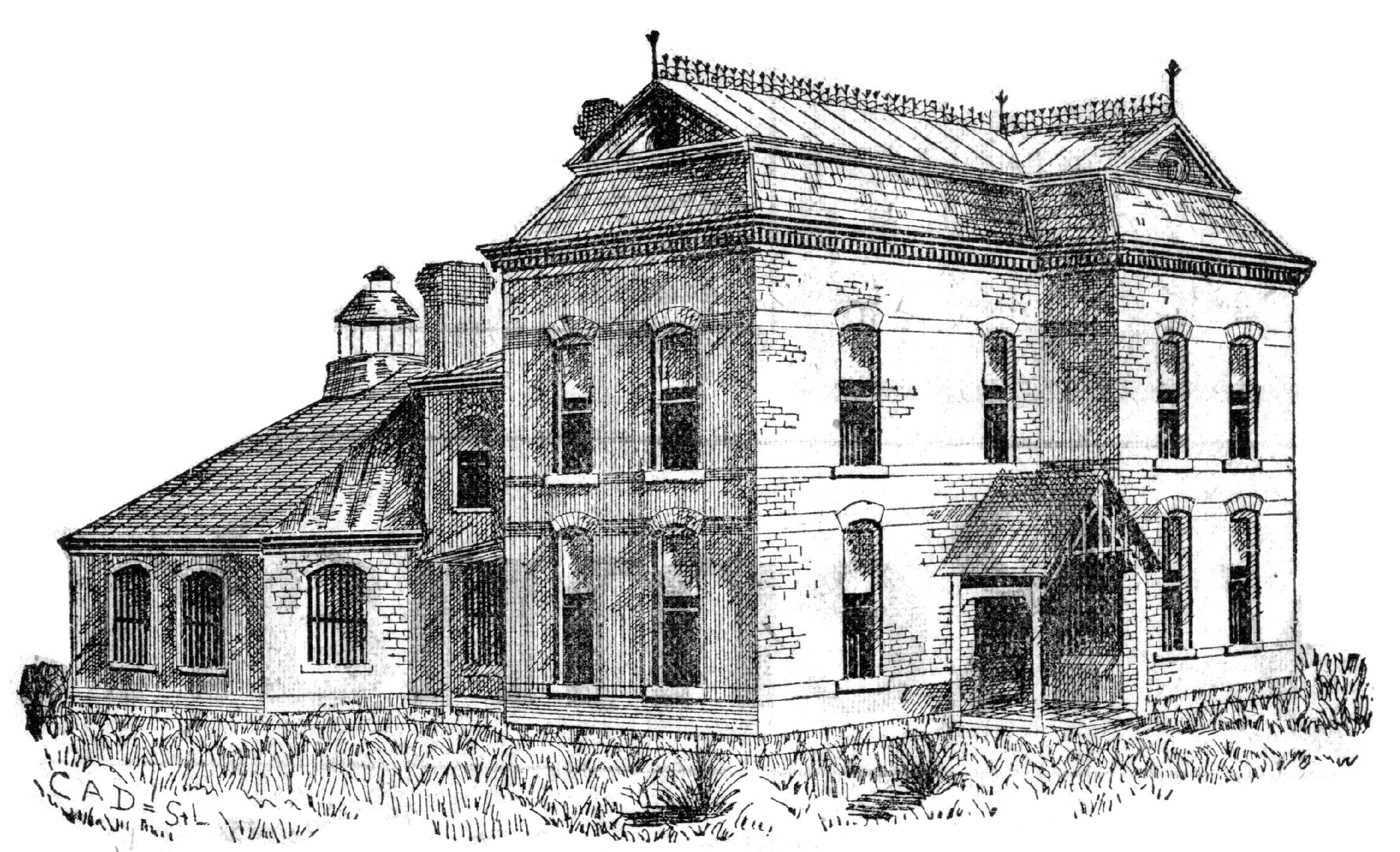Frontier lawyer Henry Clay McDougal took on the fearsome outlaw in court — and never backed down, The following, written by Jim Muehlberger, is entitled “Showdown with Jesse James.”
Among the most dangerous and feared bad men on the Western frontier, Jesse James frightened folks even in states where he had never set foot. Yes, some people most notably the citizens of Northfield, MN, fought back when Jesse and his famous James-Younger Gang associates started to wave their revolvers around. But it usually wasn’t a very good idea to go face to face with Jesse. While robbing banks and trains, he survived at least nine gunfights and probably killed or helped kill as many as 10 people. He was rumored to have killed an equivalent number during his Civil War bushwhacking days.
Although James was never a gunslinger in the mode of say, Wild Bill Hickock, an it has been more than 125 years since his assassination, his name still strikes a chord with folks. The idea of standing exposed on a dusty main street in a showdown with Jesse sounds about as inviting as shaking hands with Bloody Bill Anderson or turning your back on Robert Ford. Who but someone plumb loco would go one-on-one with Jesse in a six-gun exchange? Even Pinkerton detectives weren’t that crazy. But one brave Missouri lawyer sought satisfaction in a more civilized way — he sued Jesse and won. Even more surprising, he lived to tell about it. Barely.
The lawsuit, actually filed against Jesse and older brother Frank, arose from a Dec. 7, 1869, robbery in Gallatin, MO, during which one of the outlaws, most likely Jesse, shot down John Sheets, cashier at the Daviess County Savings Association. As Jesse and another gunman, thought to be Frank, dashed from the bank, Gallatin’s citizens fired on them. Jesse’s horse spooked and bucked as he leaped into the stirrups. He was thrown from the saddle, but his boot remained caught in the stirrup, and the frightened horse began dragging him down the rutted street. Displaying the horsemanship and coolness under fire that would make him a legend, Jesse whipped out a knife, cut the leather stirrup and freed himself. His horse bolted, so he leaped onto the back of his accomplice’s horse.
About a miles outside Gallatin, as the tandem riders were fleeing the posse, they encountered Daniel Smoote, a well-to-do farmer. The outlaws forced Smoote (sometimes recorded as Smoot) at gunpoint to hand over the saddle horse he was riding. The gunmen then galloped off, leaving Smoote standing in the road. The magnificent racehorse left behind in Gallatin was by mid-December identified as the property of “Jesse W. James, living in Clay County.” James family affidavits filed after the crime referred to Jesse’s mare as “Kate” and claimed Jesse had sold the horse the day before the robbery. Kate, one of the finest and fastest horses in Missouri, had been entered in the St. Louis Fair and won several races.
Kate was the first tangible evidence that led to criminal charges against James. In May 1870 a Daviess County grand jury issued a murder indictment against him, and authorities posted a $3,000 reward for his capture or death. With the murder of cashier Sheets at Gallatin, 22-year-old Jesse James had announced his outlaw presence to Missouri and the nation. He would remain a wanted man the rest of his life.

This complaint was presented at the Daviess County courthouse by Attorney Henry Clay McDougal on behalf of Daniel Smoot against Frank & Jesse James.
~~~
Horse theft was nothing new for Jesse, but farmer Smoote’s reaction was. The latter hired a young and ambitious Gallatin lawyer named Henry Clay McDougal, who had only been practicing law for a year, to sue Jesse and Frank James in January, 1870, for the real value of the horse Jesse had stolen. McDougal also sued for possession of the thoroughbred racehorse Jesse left behind. McDougal, recently married, was a Union Army veteran from Virginia who had moved to Gallatin with his family only three years earlier. He was also a friend of the murdered cashier.

Henry Clay McDougal had many ties to Gallatin, MO, besides being one of the attorneys for the prosecution of outlaw Frank James in 1883. McDougal was appointed Gallatin city clerk (1968-69) and served as mayor (1870-71); he served on the school board, was probate judge for two terms and was admitted in the bar in 1868 as a member of Shanklin Low & McDougal Law Firm. He resided in Gallatin, MO, for 15 years. He was a personal friend of Capt. John Sheets, slain during the 1869 robbery of the Daviess County Savings Association. McDougal represented farmer Daniel Smoote, whose stolen horse implicated the James brothers in the murder and robbery of the bank, prompting the first bounty for their arrest.
In Gallatin, McDougal had already proved his courage in connection with another notorious outlaw. After the Civil War, much of the nation suffered a period of unemployment and lawlessness spawning a number of notorious outlaw gangs. The Reno Gang from Indiana began to terrorize the Midwest during this time. About a year after McDougal arrived in Gallatin, on November 17, 1867, outlaws broke open the safe in the Gallatin treasurer’s office and stole $23,618 in cash and bonds. John Reno was identified as one of the robbers. Daviess County Sheriff John Ballinger tracked Reno to a hotel in Indianapolis, where he found the outlaw gambling and enjoying the company of a paid “companion.” Ballinger and Pinkerton detectives captured Reno without a shot.
Ballinger brought Reno back to Gallatin and locked him in the stone-walled county jail. Worried that Reno’s remaining gang members would attempt to break Reno out of jail, or that the infuriated citizens of Gallatin would mob the jail and lynch Reno, Ballinger asked 23-year-old Henry McDougal and five other volunteers to stay in the jail and help watch the prisoners. And so McDougal spent Christmas Day 1867 in jail, guarding a dangerous outlaw.
Two years later, after the latest robbery attempt in Gallatin, McDougal soon discovered he was not Smoote’s first choice for counsel — every one of the other eight lawyers in town had turned down the farmer’s request for legal representation. Young, inexperienced McDougal was the only attorney in the town brave — or foolish — enough to take the case, as to prove the case would effectively hang John Sheets’ murder on Jesse James. This was in an age in which it was said, “To raise your voice or hand against the Jameses’ nefarious operations would cost you your life.”
In fact, soon after McDougal filed the lawsuit, attorney Samuel Harwicke of Liberty, MO, and another man took McDougal around the corner of the old Gallatin courthouse and told him Jesse James had sworn to kill him on sight for seeking possession of the outlaw’s famous racing mare. “As Jesse knew me and I did not know him,” McDougal later wrote, “there was nothing left for me but to take my medicine in absolute silence, and I did.” But Jesse had picked the wrong lawyer to threaten. The threats only prompted McDougal to work with the Pinkerton detectives to track down Jesse. McDougal’s law partner, Marcus A. Low, would meet with Missouri Governor Thomas T. Crittenden 12 years later to offer $10,000 in railroad money for Jesse’s capture, which ultimately led to the outlaw’s murder.
McDougal’s suit against Jesse James didn’t hurt the young lawyer’s popularity in Gallatin. In fact, it made him something of a celebrity. On the first Tuesday in April 1870, McDougal was elected mayor of the town without opposition, a position he would hold for two terms before declining a third. Colonel James McFerran, founder of Gallatin’s Daviess County Savings Association, became his first law partner. And in 1872 McDougal was elected the youngest probate judge in county history. He would thereafter be known as “Judge McDougal.”
~~~
Jesse James lawyered up, and the legal fight was on. Frank and Jesse hired Samuel Arbuckle Richardson, the most experienced and successful lawyer in the county, to represent them. Richardson’s knowledge of the law made him one of the most formidable antagonists at the bar to be found anywhere. Men loved or feared him. Richardson’s first move was to ask the judge to squash the service of the complaint, which Clay County Deputy Sheriff John S. Thomason had left at the James family cabin outside Kearney, MO. Richardson argued that Thomason had not established whether a James family member received the lawsuit. The judge granted Richardson’s requested relief, giving the brothers a reprieve. Unless McDougal could somehow serve the complaint on the James boys, the lawsuit was dead in the water.
Meanwhile, in the media storm surrounding Sheets’ murder, Jesse had come to the attention of John Newman Edwards, former Confederal major and founder of The Kansas City Times, who was railing against injustices (perceived and real) being inflicted on former Confederates and encouraging them to jump back into politics. The fiery ad flamboyant Edwards had read about the Gallatin robbery and the notion that Jesse had killed the cashier because he believed the man to be Major Samuel P. Cox, a former Union officer. Cox, who was a resident of Gallatin, had ambushed and killed Bloody Bill Anderson, Jesse’s ruthless Civil War guerrilla leader, in October 1864.

Formerly of the Confederate Missouri Brigade, prominent newspaper publisher John Newman Edwards defended the James Boys to arouse public sympathies and also arranged for the surrender of Frank James.
Edwards was fascinated that Jesse had apparently committed murder in the name of the Confederate cause. The publisher arranged a meeting with the outlaw, after which he decided Jesse was a horse he could ride for a distance to further the postwar Southern cause. In June, 1870, Edwards assisted the outlaw in writing the first of Jesse’s many letters to the newspapers. In the letter, Jesse professed his innocence, claimed he was being persecuted for being a former Confederate fighter and offered to turn himself in, if only he would be guaranteed a fair trial. This appeal to the sympathies of former Confederates by waving the Stars and Bars of the Old South was a risky approach — but it worked.

Gallatin attorney H.C. McDougal was just embarking upon his impressive career when he agreed to represent farmer Daniel Smoot in a lawsuit against Jesse James.
Henry McDougal decided to fight fire with fire. As Jesse sought to try the case in the press, McDougal conceived of a novel (at that time) idea to serve Jesse with a complaint: He obtained an order from the Gallatin court that allowed McDougal to inform Jesse of the lawsuit by publishing it in the Gallatin newspaper. So served, the lawsuit was allowed to proceed, and Jesse’s lawyer was ultimately forced to file an answer to Smoote’s accusations. Jesse denied he was in Gallatin on December 7, 1969, and hence denied he had stolen Smoote’s horse.
After two years of legal gunslinging, Jesse found himself outmatched by McDougal’s legal skills and was unable to fight his way out of the lawsuit. When Jesse and Frank refused to appear for trial, the judge ruled in Smoote’s favor on October 20, 1871, awarding him with Jesse James’s prized racehorse. Kate remained an object of considerable interest to visitors over the years, and Smoote raised several fine colts from her. Jesse elected not to appeal but, true to his outlaw nature, twice tried to murder McDougal, narrowly missing each time.
~~~
On April 3, 1882, McDougal was in his office with Major Cox when he received a telegraph from law partner Marcus Low: James Gang member Robert Ford had killed Jesse at his home in St. Joseph, MO. In silence McDougal read the wire and then passed to Cox. After Cox finished reading it, McDougal said, “Major, you don’t know what a load that message takes from my mind.” With the fire of war again blazing in his eyes, Cox astonished McDougal by telling him “By Gad, sir, I do know, and I am perhaps the only living man that has known all about this matter for years.” Cox then told McDougal that back in Kentucky he had known the father of Clell Miller, and that in the battle in which he had killed Bill Anderson in Ray County, MO, in 1864, Cox had recognized Clell, only 14 at the time, who was in Anderson’s command and was severely wounded. Cox had driven away one of his men, who was in the act of finishing the boy.

The life and adventures of Gallatin favorite son Samuel P. Cox reflects many parts in the development of the early Old West in America. He was involved in the westward movement, the Mexican War, various Indian wars, the California Gold Rush, and served as a Union major during the Civil War. He was a popular elected official in Daviess County and was linked to the 1869 bank robbery and murder alleged against Frank & Jesse James. Major Cox [1828-1913] is buried in Brown Cemetery, north of Gallatin, MO.
One evening as McDougal and his wife took a stroll, arm in arm, Jesse, Miller an Liddell had waited in ambush behind a hedge. According to Cox, “Her presence alone prevented Jesse from making good his threat in 1871.” It is unknown whether Southern chivalry — or the desire to avoid leaving a witness — prevented Jesse from taking the shot.
In 1883 Governor Crittenden appointed McDougal as a prosecutor in Frank James’ murder trial, billed as the “Trial of the Century.” McDougal also assisted former Sheriff Ballinger in guarding and protecting Liddell, now turned state’s witness, who received almost daily death threats. Liddell told McDougal that in 1882, on Jesse’s last visit to his boyhood home in Kearney, just before he moved to St. Joseph, the outlaw had tried again to kill McDougal.

James Gang member Dick Liddil’s testimony during the 1883 trial of Frank James made a very damaging case against defendant Frank James. Defense attorneys tried to block Liddil from taking the witness stand on the grounds that Liddil had been convicted and sent to the penitentiary for felony (for horse stealing, with disfranchisement a consequence), and that Liddil had never been granted a pardon. But Judge Goodman noted the exception and allow Liddil to testify.
Liddell said he was with Jesse when he took a shot at McDougal as the lawyer sat in the smoking car of a Rock Island train shortly after leaving the Kearney depot, near the St. Joseph public road crossing. McDougal had been returning to Gallatin from Kansas City. Jesse’s minie ball shattered a window to McDougal’s right, showering glass on the lawyer’s face. McDougal recalled the incident. At the time he told his wife, who was traveling in an adjacent car, that a reckless boy had thrown a stick at the window, in order not to alarm her. While he always suspected the truth, McDougal had never been sure who had fired that shot until Liddell pointed the finger at Jesse.
~~~
At the August 1883 Frank James trial in Gallatin, McDougal and the other attorneys chose not to prosecute Frank for Sheets’ murder, as the case against him was weak, and anyway, the late Jesse James had most likely killed the cashier. Instead, Frank was charged with killing a man during the gang’s Winston, MO, train robbery. But the jury acquitted him on September 8. After the trial, McDougal moved to Kansas City. In 1885 he entered into a law partnership with former Governor Crittenden, who had pardoned Bob and Charlie Ford after Jesse’s assassination. Crittenden described McDougal as a “first class lawyer, learned in the black-letter wisdom of the books an as pleasant a social companion as ever a man had or could wish to have.”
In 1895 McDougal became Kansas City’s first counselor, and he successfully represented the city before the U.S. Supreme Court over the acquisition of its water supply and plant, which paved the way for the city’s growth. McDougal died at age 71 on December 17, 1915.
Gallatin in many ways represented both the origin and the terminus of the James boys’ outlaw days. As a result of the 1869 murder of cashier John Sheets, Jesse became a wanted man — for the first time and for the remainder of his life. Gallatin was also the site of Frank James’ 1883 murder trial, in which he was acquitted. The same lawyer, Henry McDougal, prosecuted both the 1870 civil case over the stolen horse and Frank’s 1883 murder trial.
Although authorities were never able to bring Jesse James to justice, second-year lawyer Henry McDougal was able to recompense one of the outlaw’s many victims. McDougal witnessed a remarkable era in the history of Missouri and America, an era in which the gavel eventually won out over the gun. His life story proved more fascinating than any legend. And in many ways, McDougal is the real hero of the story, for surviving his showdown with Jesse James, even though “the Judge” didn’t fire a single bullet before riding off into the sunset.
~~~

Authentic legal documents were rediscovered in August, 2007, by James Muehlberger, shown here with Daviess County Recorder Sue Bird.
The post was written in 2007 by Jim Muehlberger, a Kansas City trial lawyer and former prosecutor, for publication in the February 2010 issue of Wild West magazine (pp. 50-53). Muehlberger found the long-lost lawsuit filed by H.C. McDougal against the James boys in the back of a dusty file cabinet at the Daviess County (MO) court clerk’s office. He also recommends Henry Clay McDougal’s Recollections: 1844-1909. Images shown here were added for digital display.

